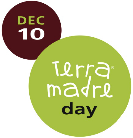Dear All,
After several years of suspension, we are happy to greet the restart of your electronic newsletter. It is a very useful and important tool, enabling you to remain up to date with what is happening in the world of Slow Food.
Many years have passed since Slow Food began not only its activities but also its growth in Canada.
At the very beginning, Slow Food started its activities by recognizing the importance of the pleasure of food. We learned to enjoy the vast range of flavours and recipes available, and recognize the variety of places and people involved in growing and producing the food we eat. We should also respect the natural rhythms of the seasons and conviviality, the enjoyment of dining and sharing that enjoyment with others. But the recipe developed by Carlo Petrini and other Slow Food members adds another ingredient to the pursuit of pleasure; namely, responsibility. This philosophy was called eco-gastronomy and combines a respect for and interest in food and wine culture with defenders of food and agricultural biodiversity around the world. Few years later, Slow Food added another new important ingredient, namely the concept of Good, Clean and Fair.
Good, clean and fair are three adjectives that describe in the most basic way the characteristics that food must have. ‘Good’ describes the complex sphere of feelings, memories and identity derived from the sentimental and sensorial value of food. ‘Clean’ food is produced respecting ecosystems and the environment. ‘Fair’ food is in line with social justice and fair compensation in the workplace and in commercialization. Eating thus becomes an agricultural act, and by choosing food that is good quality, products that are grown with respect towards the environment and local traditions, we can protect biodiversity and ensure a more fair and sustainable agriculture.
Slow Food at a global level can play a crucial role in changing the food system, and here are some facts that show how much the system is broken:
- The number of people suffering from starvation becomes bigger and bigger (about 1 billion);
- The number of people suffering from diseases connected to bad food habits becomes bigger and bigger too (nearly 2 billion);
- Industrialized agriculture is the main cause of the deterioration of the environment and of global warming;
- The world is losing its diversity and its biodiversity, including the connection with our history, our identity and our culture.
Slow Food seeks to create a broad cultural shift in the relationship people around the world have with food.
To do this, we need to work at a global level through our network – involving as many people as possible – and at a local level, through our convivia – that work closely with the Slow Food communities in their area.
Slow Food has more than 1400 local convivia all around the world, run by volunteers. If we consider that every convivia makes three or four events a year, this means 5000 Slow Food events a year, namely 14 events a day, that means more than one Slow Food event every two hours.
All together we can really do something to change the modern incorrect food system, because if we will join our forces, we will be stronger and able to involve more people: producers, co-producers, chefs, restaurateurs, scientists, journalists. We will be able to involve all those who believe, like we do, that eating differently is possible.
Slow Food acts on different levels, everywhere on the planet, carrying out projects, organising meetings and campaigns. Slow Food is bringing forward many projects on the international level that involve the whole network and reflect our philosophy. One of them is the project “A Thousand Gardens in Africa.” And at the same time at the local levels with the help of volunteers Slow Food works to promote themes, philosophy and values of the movement.
There are many challenges that we are to face, and only joining our efforts and staying all together we will be able to resist and to win. I therefore want to sincerely thank all those who are working in Canada to achieve good, clean and fair world for all of us.
Thank you and please feel free to contact us if you need any further information.
Best regards,
Paolo Di Croce
Secretary General – Slow Food International
